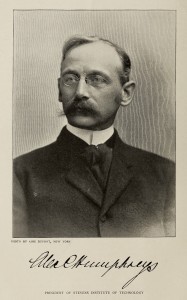Profile – Alexander Crombie Humphreys circa 1903

Alexander Crombie Humphreys, President Stevens Intitute of Technology – Portrait
from Cassier’s Magazine 1903
That the engineer should be a business man, or at least conversant with business conditions and methods, has been the leading principle in Dr. Alexander Crombie Humphreys’ just opening career as an engineering educator, and Stevens Institute of Technology, atHoboken, N. J., of which he became president last year, will thus profit largely by the infusion of a healthy business spirit in all its departments.
The selection of Dr. Humphreys to succeed the late Dr. Henry Morton as the head of the above institution was a peculiarly fitting one. Dr. Humphreys himself graduated at Stevens in the early eighties under special conditions, to be referred to later, and in the succeeding twenty odd years achieved distinctive success in practical engineering work both as chief engineer and general manager of what is probably the largest gas engineering company in existence, and as senior member also of the firm of Humphreys & Glasgow, who have done much, both here and abroad, in bringing gas works practice to a high plane of excellence.
Labouring thus, Dr. Humphreys had full opportunity to discover and appreciate the needs of the young engineer in practical life, and when he entered his new field of work as a college president he took with him the vital atmosphere of the workshop and business office, and this has since then been the atmosphere at Stevens. In this respect Dr. Humphreys splendidly exemplifies the correct modern idea of what an engineering college professor should be, — not the development of the musty class and lecture room towards which there is still an unfortunate leaning, — but the man of affairs in the engineering business world, the man who has made contracts as well as plans and specifications, who knows what things will cost as well as what they will do, and who has wrestled with the many problems which come constantly into the battles of everyday engineering work.
Dr. Humphreys is Scotch by birth, having been born at Edinburgh in 1851. His father was Edward R. Humphreys, M. D., LL. D. , a well-known classical scholar and educator; and his mother was Margaret MacNutt, of Prince Edward Island, Canada. In 1859 the family moved to Boston, and at the age of fourteen young Humphreys secured an appointment to the United States Naval Academy, passing the preliminary test examination. It then developed that he was under the required age for entrance, and he was, therefore, debarred by the authorities. It being necessary that he should do something for his own support, he found a position in an insurance company. Two years later this company failed, and he secured a position with the New York Guaranty and Indemnity Company, now the Guaranty Trust Company.
With this company he remained until 1872, by which time he had risen from office boy to receiving teller and assistant general bookkeeper.
For years he spent much of his spare time working with tools, and since 1871 he had been brought into contact with things practical through acting as secretary to the building committee of the Bayonne & Greenville Gas Light Company. Upon the completion of this company’s works, in 1872, he was offered by its board the position of secretary and treasurer, which he accepted. A year later he was also made superintendent.
After toiling for five years at the underlying drudgery of the business he perceived that he was not justifying the hope of notable success in his work. Having convinced himself of what he considered his unfitness for his occupation, he did not cast about for more congenial and promising employment, but straightway grappled with himself.
It was not his work, but himself, that aroused his dissatisfaction. He felt the will to wring success out of existing circumstances, and looked to increase his forces rather than smooth his path.
His deliberate conclusion was that he needed special technical education in order to raise his work to a satisfying plane. His rare powers of analysis, which subsequent experience ripened into his present judicial poise, were even then focused upon himself as dispassionately as they were applied to exterior relations. Even at that time Dr. Humphreys showed the ability to measure himself against opposition, and fortify himself accordingly with the energy and resolution to act upon his conclusions.
His characteristic self-confidence is but the logical result of this power of adjusting force to counterforce. Having reached this conclusion, as an accountant arrives at his balance, he was not long in making new and radical dispositions.
His attention having been directed to Stevens Institute, he presented his case fully to the president, the late Dr. Henry Morton, and finally obtained permission to follow the lull regular course while absenting himself from all recitations and lectures, except those he could cover in two mornings of each week, provided he would attend all reviews and all examinations, and would arrange to do outside of the Institute all the prescribed work not covered in the hours of attendance. Under these conditions President Morton thought it might be possible to complete the four-years’ course in six years, but he did not hold out much hope.
Humphreys had left school at the age of fourteen, twelve years previously. He was without the habit of study and utterly unqualified to pass the entrance examinations of the Institute. A year spent in preparation, however, enabled him to successfully pass the examinations, and, in 1877, at the age of twenty-six, he commenced study with the class of 1 88 1. During the next four years he attended to his duties in the gas company and kept up with his class at the Institute, graduating in 1881, at the age of thirty.
He thus compressed into his few “spare moments” the work which normal students, fresh from advanced schooling, accomplished only by four years of unremitting application. The president and faculty of the Institute passed a formal resolution congratulating him upon his success in graduating with honours under such exceptional conditions.
It is not out of place here to mention the generous confidence of Humphreys’ employers, who granted him a leave of absence for the necessary two mornings weekly, although realising that such action must ultimately result in the loss of his services. Indeed, such was the case, for shortly after his graduation Humphreys became chief engineer of the Pintsch Lighting Company, of New York.
In this position, which he held for over three years, he built many oil gas works, acquired great experience in the manufacture and utilisation of gases of high illuminating power, and ascertained the gas-making values of all kinds of oil, especially with reference to the compression and storage of gas for the lighting of railway trains, ferry-boats and light-buoys. To this end he conducted much experimental and demonstrative work, and greatly broadened his previous knowledge of the gas industry.
In 1885 Dr. Humphreys was appointed superintendent of construction for the United Gas Improvement Company and shortly afterward general superintendent, with headquarters in Philadelphia. During Dr. Humphreys’ decade with the United Gas Improvement Company the increase in his responsibilities more than kept pace with the marvellous growth of the company. He was first constructing engineer, next general superintendent, then he annexed the contracting department, then the purchasing agent’s department, and finally the commercial management of all of the company’s works.
Under the uniform system developed by Dr. Humphreys the parent company’s many properties were operated from Philadelphia, and by constant comparison of results the experience gained at one property was applied for the benefit of all. In addition, he was acting general manager of the Welsbach Incandescent Gas Company, controlled by the United Gas Improvement Company, while its independent organisation was being effected. During this time the number of gas works comprised in the latter company’s system increased from ten to nearly forty.
In May, 1892, the firm of Humphreys & Glasgow, of London, was established; and in August, 1894, Dr. Humphreys retired from his official connection with the United Gas Improvement Company in order to establish the firm of Humphreys & Glasgow, of New York, and the two firms together, notwithstanding their relatively short period of existence, have done a very large amount of splendid work along the lines of advanced gas engineering.
When, in the early part of last year, the presidential chair of Stevens Institute became vacant through the much-lamented death of Dr. Henry Morton, Humphreys at the very outset was mentioned for the office. He was not only generally considered to have all the desired qualifications for this important trust, but he was also the Institute’s most distinguished graduate, and in conferring upon him the honour of the presidential appointment the Institute, after all, was but honouring itself. It remained then for Dr. Humphreys to be prevailed upon to sacrifice various other interests so that he might properly devote himself to the new educational ones, and with this part of the problem satisfactorily disposed of, the new regime at Stevens began practically with the beginning of the college year in the autumn of 1902.
Mr. Arthur Glasgow, Dr. Humphreys’ business associate, and himself a Stevens man, in speaking of the appointment at the time and of the advantages which accrue to the Institute through the new president, remarked:
“Obstacles must be stubborn indeed to withstand his vitality and resolution, while his judicial mind, with its searching powers of concentration, will suffer no straying after false gods. He combines the most rugged qualities of action and progress with the tenderest human sympathies. His splendid self-confidence is not that born merely of success, which, when fortune changes, proves too often but a species of mental intoxication; but it is based upon habitual judgment from a comprehensive perspective, disclosing all influencing circumstances in their relative values.”
“His personality must lend new life to a field unploughed by such forces, for not before has technical education been directed by so unique a blend of broad technical attainment, rare executive ability and experience, and that comprehensive grasp of practical affairs which alone unites cause and effect with a true sense of proportion, and conserves to maximum usefulness the energies within its sphere of influence.”
“Since 1891 Mr. Humphreys has been a prominent trustee of then Institute. He is past-president of the Alumni Association, and has founded a scholarship. He initiated the course in business methods and bookkeeping, and has lectured to the undergraduates and addressed the graduating class. As president, therefore, he is an old friend in a new and more potent guise, and his heart is in the work.”
Early in 1903 President Humphreys received from the University of Pennsylvania the honourary degree of Doctor of Science, and, in June, from Columbia University the honourary degree of Doctor of Laws.
